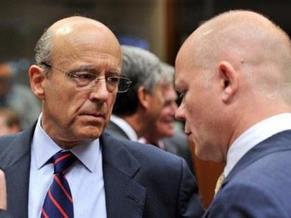|
World Jewish News

French Foreign Minister Alain Juppe (L) talks to his British counterpart William Hague prior to the start of a European Union Foreign Affairs council session on July 18, 2011 at the EU Headquarters in Brussels. Photo: Georges Gobet in Brussels, AFP Copyri
|
EU presses Israel and the Palestinians to resume peace talks to avoid divisive UN vote on Palestinian statehood
20.07.2011, Israel and the World The European Union is pressing Israel and the Palestinians to resume peace talks in order to avoid a United Nations vote on Palestinian statehood in September, an issue which is dividing the EU member states.
After their monthly meeting in Brussels on Monday, the EU Foreign Ministers issued a statement reiterating the EU “concern” at the continuing stalemate in the Peace Process and calling on the parties “to show the highest sense of responsibility and to resume direct and substantive talks.”
“The EU stresses the central role of the Quartet and fully supports the EU High Representative in her continued efforts for the Quartet to create a credible perspective for the re-launching of the peace process.”
During the meeting, the EU foreign policy chief Catherine Ashton briefed the 27 ministers on the Mideast Quartet meeting in Washington on 11 July and the state of play regarding the efforts to relaunch Israeli-Palestinian negotiations.
The ministers voiced their concerns days after US Secretary of State Hillary Clinton, Catherine Ashton, Russian Foreign Minister Sergei Lavrov and UN chief Ban Ki-moon failed to agree on a common statement.
"The EU stresses the central role of the Quartet and fully supports the High Representative (Catherine Ashton) in her continued efforts for the Quartet to create a credible perspective for the re-launching of the peace process," they said.
“The EU continues to believe that urgent progress is needed towards a two state solution to the Israeli-Palestinian conflict,” the statement added.
Ashton said envoys from the Quartet were still trying to draft a statement.
"We are still working in the Quartet to see if we can pull together a statement," she said. "It's not easy because the purpose of this statement is to get the talks going again, so it needs to be very inclusive."
The Palestinians have been looking to seek statehood recognition at the UN General Assembly in September.
But the United States has threatened to use its veto power against the move.
In the EU, several members states, including Germany, Italy and the Netherlands, have opposed the Palestinian efforts while France and Spain have indicated they might recognise a Palestinian state.
The diplomatic consequence of a UN vote on a Palestinian state could be far-reaching.
It could prompt the US Congress to cut off aid to the Palestinians while Israel and the United States could end up isolated in their positions. And the EU would have to deal with its own internal divisions.
Ashton sought to play down the risks involved in any UN resolution on a Palestinian state.
"I don't think it's a diplomatic tragedy for us and we don't yet know what the resolution will be," she said.
EU states, British Foreign Minister William Hague said, are "reserving our position for the moment" on the possible recognition of a Palestinian state.
"We will see of course what happens over the coming weeks," Hague said. "We want Israelis and Palestinians to return to direct talks."
He added: "The position on recognition is one that we will decide on if necessary come September, but it is far preferable for talks to resume.
US President Barack Obama moved closer to the EU's position in May when he voiced support for a two-state solution based on borders dating before the Six Day War of 1967, with possible territory exchanged in negotiations.
But at the Quartet talks in Washington last week, Russia, the UN and the EU rejected a US proposal that was "throwing off balance the parametres for negotiations proposed by Europe," said French Foreign Minister Alain Juppe.
Juppe cited among the problems demands to "mention a Jewish state." This Israeli demand has yet to be accepted by the Palestinians.
"As far as I know, in Israel today there are Jews but there are also
Arabs," Juppe said.
by: Yossi Lempkowicz. Yann Ollivier from AFP in Brussels contributed to this report.
EJP
|
|
